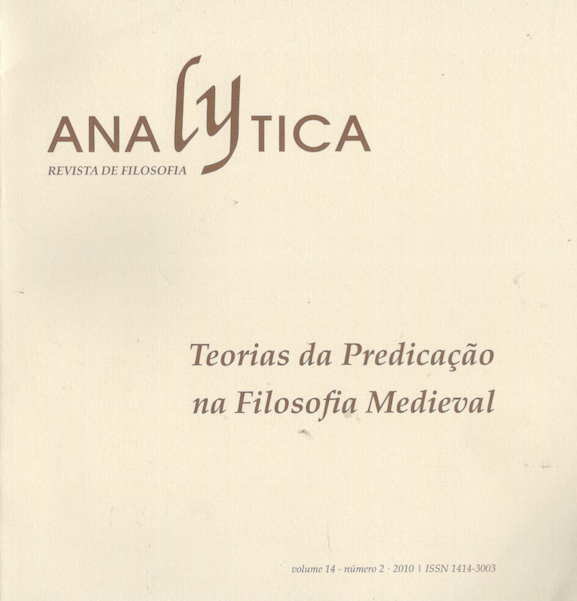William Crathorn on predication and mental language
Resumo
Guilherme de Crathorn é bem conhecido por suas posições provocativas sobre vários importantes temas de filosofia e de teologia de seu tempo. O presente artigo aborda a teoria nominalista de Crathorn sobre a linguagem mental com o intuito de mostrar que ela se encaixa em sua teoria do conhecimento mais geral e sistemática, mas também que ela traz problemas que dizem respeito à natureza da predicação mental. Com efeito, contrariando Guilherme de Ockham, Crathorn afirma que não há uma linguem mental natural. Seres humanos podem possuir representações naturais, mas seus pensamentos linguísticos têm sempre um sentido convencional proveniente de linguagens convencionais. Após ter inventado palavras escritas e faladas em numa linguagem particular, a mente humana é capaz de formar algumas representações naturais dessas palavras. Mas essas representações não significam o que elas representam, mas o que é significado pelas palavras que elas representam. Nós evidenciamos dois problemas fundamentais nessa teoria: 1) ela é incapaz de oferecer uma explicação coerente das diferenças entre os termos mentais que correspondem ao sujeito, à cópula e ao predicado; 2) ela não pode explicar como palavras podem estar por diferentes coisas em vários contextos proposicionais (a suppositio dos termos). De fato, Crathorn não pode manter a distinção entre suposição simples e material, isto é, as situações nais quais um termos está por um conceitos ou por uma ocorrência material da palavra, como se dá com o termo-sujeito nas seguintes proposições: "cavalo é um conceito" e "cavalo é uma palavra".
Abstract
William Crathorn is well known for his provocative views on many important philosophical and theological issues of his time. This paper focusses on Crathorn's nominalist theory of mental language, in order to show that it enters in his more general and systematic theory of knowledge, but also that it raises some problems concerning the nature of mental predication. Indeed, contrary to William of Ockham, he affirms that there is no natural mental language. Human beings may have natural representations, but their linguistic thoughts always have a conventional meaning coming from conventional languages. After having invented spoken and written words in a particular language, the human mind is able to form some natural representations of theses words. But these representations do not mean what they represent, but what is signified by the words they represent. We argue that there are two major problems with this theory: 1) it cannot give a coherent account of the differences between the mental terms corresponding to the subject, the copula and the predicate; 2) it cannot explain how words can stand for different things in various propositional contexts (thesuppositio of terms). Indeed, Crathorn cannot maintain the distinction between material and simple supposition, i.e. the situations where a term stands for a concept or for an material occurrence of the word, such as the subject term in the following propositions: "horse is a concept" and "horse is a word".
Downloads
Downloads
Publicado
Como Citar
Edição
Seção
Licença
Os autores que publicam nesta revista concordam com os seguintes termos:
- Os autores mantêm os direitos autorais e concedem à revista o direito de primeira publicação, com o trabalho simultaneamente licenciado sob a Licença Creative Commons Atribuição-SemDerivações 4.0 Internacional (CC BY-ND 4.0), que permite a redistribuição, comercial ou não comercial, desde que a obra original não seja modificada e que seja atribuído o crédito ao autor.
- Os autores têm autorização para assumir contratos adicionais separadamente para distribuição não-exclusiva da versão do trabalho publicada nesta revista (ex.: publicar em repositório institucional ou como capítulo de livro), com reconhecimento de autoria e publicação inicial nesta revista.
- Os autores têm permissão e são estimulados a publicar e distribuir seu trabalho online (ex.: em repositórios institucionais ou na sua página pessoal) a qualquer ponto antes ou durante o processo editorial, já que isso pode gerar alterações produtivas, bem como aumentar o impacto e a citação do trabalho publicado (Veja O Efeito do Acesso Livre).


